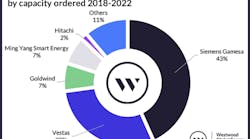Offshore staff
LONDON — A new report from industry association Offshore Energies UK (OEUK) and Robert Gordon University (RGU) in Aberdeen sets out steps needed for the UK to support jobs, economic growth and innovation well into the future.
It claims that the wider offshore energy sector, including oil and gas operators and wind developers, could invest up to £200 billion ($261.7 billion) in UK projects over the remainder of this decade.
More than £90 billion ($117.8 billion) could go to UK supply chain companies over the next decade if the goals of the roadmap and the government’s energy production and local content targets are achieved, OEUK added.
The roadmap details the industry, government and regulatory actions needed in six main areas to build and support UK capabilities from 2022-2035. Opportunities include development and licensing of new technologies, production of equipment, installation and maintenance of assets, and eventual decommissioning of offshore energy facilities.
Certain issues, however, may impact the process such as the loss of UK steel manufacturing capabilities and losing investment due to Britain’s unpredictable regulatory and fiscal environments.
According to OEUK, other countries have plans to attract supply chain investment such as the US Inflation Reduction Act. So, politicians and governments need to place greater emphasis on an energy future built in the UK rather than an industry sourced from abroad.
Under a best-case scenario involving full delivery of the British Energy Strategy, 50% of projects would be delivered by the UK supply chain, generating 50 GW of offshore wind capacity, 10 GW of hydrogen production, 30 million metric tons of carbon captured and stored per year, with prioritization of domestic oil and gas production over imports during this period.
A low investment scenario, in which there is no new UK North Sea oil and gas development and a slow pace of investment in new energies, would only deliver £60 billion ($78.5 billion) to UK supply chain companies.
For all outlooks, the report claims that oil and gas will continue to represent the biggest opportunity for the UK supply chain until at least 2027.
Katy Heidenreich, OEUK director, Supply Chain and People, said, “For a country with a proud maritime and industrial heritage, we must question why so much of the nation’s energy manufacturing needs are met from outside of the UK. To deliver an energy future that benefits the UK economy, jobs and innovation, we need both the volume of work and the focus on supply chain companies here winning a bigger share of that work. As we build this future, there is no simple choice between oil and gas in one hand and renewables in the other. The reality is that both are needed to keep the lights on and grow the economy. With oil and gas expected to remain a sizeable chunk of supply chain opportunities until at least 2027, we can understand why so many supply chain companies are telling us they are worried about political support for the sector. The supply chain needs a pragmatic and long-term approach if it is to thrive here."
Sarah Cridland, vice president of Subsea Projects and Commercial & Country Manager UK, TechnipFMC, said, “The UK has long been a key focus area for TechnipFMC, and this remains true with regard to renewable energies. We set ambitious targets as a company to help the world meet its energy needs and are seeing tangible progress, notably and locally in our development of subsea systems, including all-electric trees, to help capture and store CO2 and high-voltage interarray power cables to enable offshore floating wind. We have a highly skilled workforce here in the UK, working to meet the needs of the energy industry, both now and in the future. What we know and can do now has clear applications in energy transition technologies—our expertise in technology development and integration is an essential part of this transformation. And thanks to our historical investment here, we are in a good position to execute projects in this new frontier.”
07.17.2023









